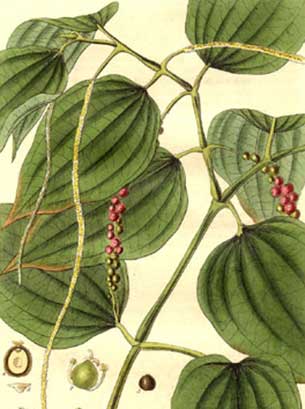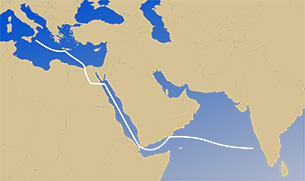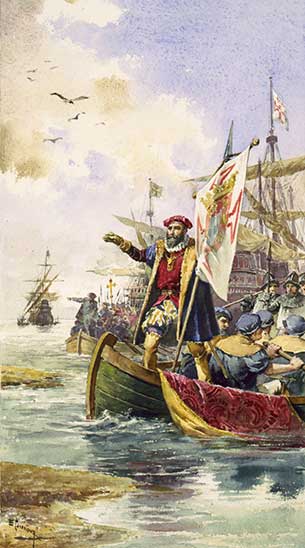Good Health
Black pepper has a long history of use in traditional systems of medicine like Ayurveda, to aid digestion and the absorption of nutrients and herbal medicines. Pepper is said to have broad antimicrobial, anti-parasitic and insecticidal properties. These properties are attributed to the alkaloid Piperene, a key ingredient of pepper.
Black Gold
Pepper was known as Black Gold in the Middle Ages as it used to be worth its weight in gold. In the fifth century, 3,000 pounds of pepper was demanded as ransom by Alaric the Visigoth for sparing Rome. Pepper grew in the hills of southwest India, and demand for the valuable spice made the Malabar coast one of the world's great destinations. Pepper, indispensable to preserving meat, sold in Europe for 600 times its cost in India during the 16th and 17th centuries.
Transforming the World
I am black on the outside, clad in a wrinkled cover,
Yet within I bear a burning marrow.
I season delicacies, the banquets of kings, and the luxuries of the table,
Both the sauces and the tenderized meats of the kitchen...
Pepper was transported to Europe overland across Asia on the Silk Road during the middle ages. With the collapse of the Byzantine Empire in the 15th century, all overland routes were controlled by the Ottoman Empire, which limited the passage of European merchants. Conflicts, tariffs, and taxes drove the price of pepper up 30-fold. In response, Spain and Portugal attempted to find a sea route to India, initiating the European Age of Discovery. In 1492 Christopher Columbus accidentally discovered the Americas, landing on islands that he thought were part of India. Columbus knew that the world was round and was convinced that a quicker and easier route to India could be found by sailing west. But Columbus thought the earth was smaller, and ended up 8,000 miles from his intended destination.
- Riddle
Saint Aldhelm, Bishop of Sherborne, England,
7th-century A.D.
In 1497 Vasco Da Gama discovered the first sea route from Europe to the Malabar, sailing from Lisbon around the Cape of Good Hope, and landing at Kappad in North Malabar in May 1498. With the new sea route to the Spice Coast, immense fortunes were made by European spice traders during the 16th and 17th centuries, and the colonization of Asia followed. The US entered the pepper trade at the end of the 18th century, circumventing local monopolies maintained by the Dutch and other European sea-faring powers. Yale University, for instance, owes its existence to the philanthropy of Elihu Yale, whose fortune was made in the spice trade.


